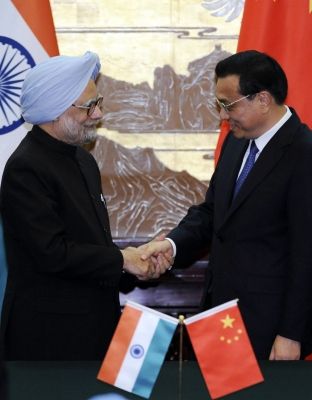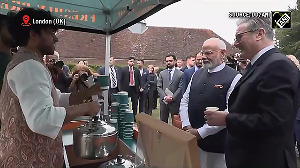 India and China on Wednesday signed in all nine agreements, including the Border Defence Cooperation Agreement and one on strengthening cooperation on trans-border rivers, after restricted and delegation-level talks that lasted over two hours as Prime Minister Manmohan Singh and Premier Li Keqiang met for the second time this year for talks which the Indian leader described as "fruitful and productive".
India and China on Wednesday signed in all nine agreements, including the Border Defence Cooperation Agreement and one on strengthening cooperation on trans-border rivers, after restricted and delegation-level talks that lasted over two hours as Prime Minister Manmohan Singh and Premier Li Keqiang met for the second time this year for talks which the Indian leader described as "fruitful and productive".
But as expected, there was no pact on liberalising the visa regime, which the Chinese side was very keen but India held back in the wake of the controversy over the stapled visas issued by the Chinese Embassy to two Indian archers from Arunachal Pradesh.
The two leaders told the media that the fact that they met twice in a single calendar year, the first since 1954 when Prime Ministers Jawaharlal Nehru and Zhou Enlai undertook visits, reflected the significance of the strategic relationship between the two countries and the agreements reached today would inject a new dynamism in the ties.
The four-page BDCA, signed by Defence Secretary R K Mathur and PLA Deputy Chief of General Staff Lt Gen Sun Jianguo, with 10 clauses that seek to maintain peace, tranquillity and stability along the 4,000 km long the LAC reiterates that neither side shall use its military capability against the other side and that their respective military strengths shall not be used to attack the other side.
In his remarks at the joint press interaction, Singh said the two countries agreed that peace and tranquillity on the borders must remain the foundation for growth in the India-China relationship, "even as we move forward the negotiations towards a fair, reasonable and mutually acceptable settlement to the India-China Boundary Question. This will be our strategic benchmark."
Affirming to continue to implementing confidence building measures in the military field along the LAC, the BDCA agreed to consider establishing a Hotline between the military headquarters of the two countries and specific arrangements which will be decided by mutual consultations.
India and China also agreed that if their border defence forces come to a "face-to-face" situation in areas where there is no common understanding of the LAC, both sides shall exercise maximum self-restraint, refrain from any provocative actions, not use force or threaten to use force against the other side, treat each other with courtesy and prevent exchange of fire or armed conflict.
"The two sides shall implement this Agreement without prejudice to their respective positions on the alignment of the LAC as well as on the boundary question," according to the deal.
The BDCA recalled the spirit of the various agreements between the two countries on border management since 1993 and the establishment of a working mechanism for consultation and coordination on India-China Border Affairs signed in January 2012.
Against the backdrop of complaints of China building dams on the Brahmaputra, the two sides signed a Memorandum of Understanding (MoU), agreeing to further strengthen cooperation on trans-border rivers, cooperate through the Expert Level Mechanism on provision of flood-season hydrological data and emergency management and exchange views on other issues of mutual interest.
Prime Minister Singh said the two sides have agreed that as large neighbours following independent foreign policies, the relationships pursued by India and China with other countries must not become a source of concern for each other.
"This will be our strategic reassurance," he said, adding "Accordingly, I suggested to Premier Li that we do things that enhance mutual trust, expanding common interest and deepen mutual understanding. I received his full support for this roadmap."
Singh said the agreement on BDCA that has just been signed will add to the existing instruments to ensure peace, stability and predictability on the borders.
To build mutual trust, he said, the two sides have agreed to enhance transparency and strengthen strategic communication at all levels, including on the shared neighbourhood.
"I flagged our interest in continued and expanded cooperation on trans-border rivers and received reassurances from Premier Li. We decided to encourage and institutionalize greater exchanges between the armed forces of our two countries," he said.
Singh said Li was receptive to his concern about the unsustainable trade balance between the two countries and they have agreed to explore avenues to bridge this gap.
"We are taking forward the suggestion made by Premier Li in New Delhi for a Chinese industrial park to act as a magnet for Chinese investment in India. We are also exploring the feasibility of the Bangladesh-China-India-Myanmar Economic Corridor connecting the two countries via the southern Silk Road."
He said, "We are determined to inject new dynamism into our economic relation by working with wider stakeholders. Even as Premier Li and I were holding our discussions, the India-China CEOs' Forum was meeting here under the same roof."
"The agreements and MOUs signed today in various areas covering defence cooperation, road transport sector, trans-border rivers, power equipment, cultural exchanges NalandaUniversity and sister linkages will build on our impressive range cooperation," Singh said.
Chinese Premier Li told the media that he was sure that the BDCA will maintain peace and stability in the border areas.
He said the joint counter-terrorism exercise in Southwest China and maritime cooperation in regional and international areas were two good steps aimed at tackling terrorism.
He also touched on India's concerns over trade and said China was ready to work with India on building infrastructure. He referred to the Bangladesh-China-India-Myanmar trade corridor and the Chinese interest in setting up industrial zones in India.
Li noted that there will be agreements and some differences but the fact that we are two old civilisations and the government and the people have wisdom to manage differences on the border and the relations will continue.
He also said that two sides agreed to maintain the momentum of the dialogue between the Special Representatives of the two countries on the Boundary Question to get a fair and mutually acceptable settlement and to jointly maintain peace, stability and tranquillity on the border.
Li hailed Singh's visit to China as a "landmark" event in bilateral relations, which will inject new impetus to ties between the two countries.
"This is another high-level visit between China and India after my visit to India in May, and it is the first time since 1954 that the Chinese premier and Indian prime minister visit each other in the same year," Li said during talks with Singh.He also praised Singh's contribution to shaping good relations between the two countries during his tenure.
Li said the Indian government and people have effectively responded to the recent powerful tropical cyclone in the country's east, which caused deaths and property losses.
He expressed condolences and sympathy to the families of the victims and those affected.
Li also thanked India for successfully rescuing 17 Chinese ship crew members near waters off India's eastern coastline earlier this month.
Singh recalled his meeting with Chinese President Xi Jinping in Durban in March on the sidelines of a BRICS summit and Li's visit to India in May. He said Li's visit to India in his maiden trip shows the importance that the new Chinese leadership attaches to its ties with India.
President Xi and top legislator Zhang Dejiang will also meet with Singh separately. Singh will deliver a speech at the PartySchool of the Central Committee of the Communist Party.
Prime Minister Singh said that he and Li agreed that the prosperity and progress of 2.5 billion Indian and Chinese people would be a major factor of Asian resurgence and global prosperity and stability.
"As leaders of large re-emerging nations, pursuing socio-economic progress in a rapidly changing and uncertain global environment, we have resolved to realise the full promise of our partnership and maintain the friendliest of relations. This will be our strategic vision," he said.
To foster mutual understanding, he said the two leaders decided to encourage provincial and sub-regional exchanges, institutionalise the High-Level Media Forum, continue youth exchanges for the next five years and celebrate the year 2014, the 60th anniversary of the enunciation of the Panchsheel principles, as the "Year of India-China Friendly Exchanges.
Singh said he and Li had candid and constructive discussions on regional and global issues of importance to India and China.
"This is one of the promising developments in our relationship," he said. He appreciated China's cooperation in NalandaUniversity.
The nine agreements signed include a MoU on NalandaUniversity, Cooperation in Road Transport and Highways and Power Equipment Service Centres in India and agreements on establishment of SisterCity relationship between Delhi and Beijing, Bengaluru and Chengdu and Kolkata and Kunming.











